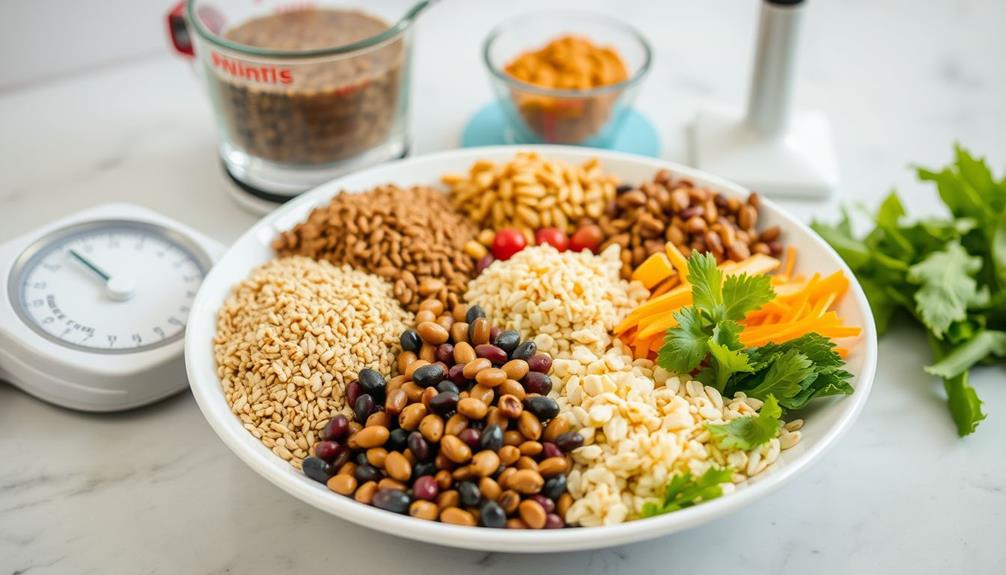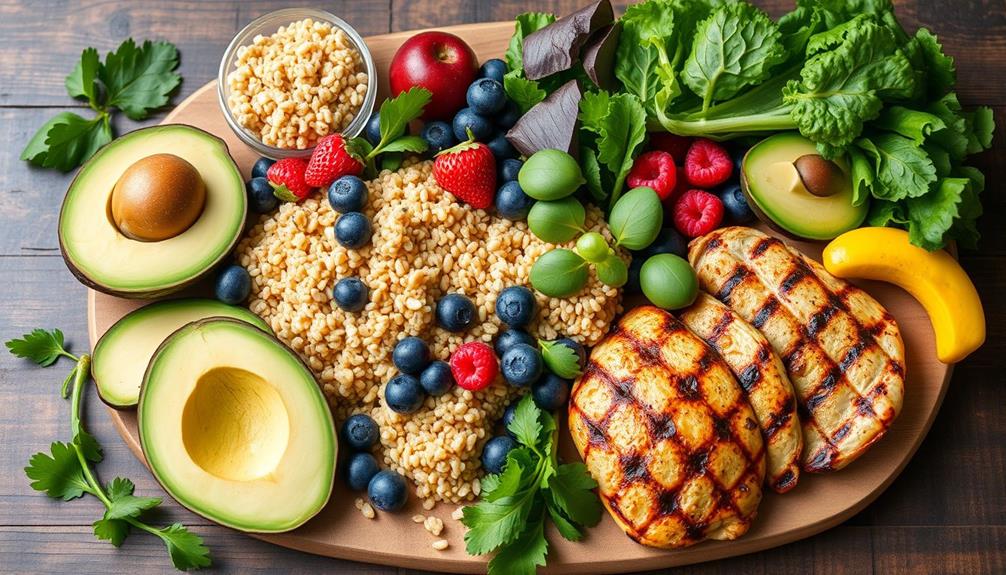To stop the keto diet without gaining weight, start by gradually reintroducing carbs. Aim to increase your carb intake by about 10 grams each day during the first week. Focus on whole, nutrient-rich foods like vegetables, lean proteins, and whole grains. Avoid high-sugar and processed foods that can spike insulin levels. Incorporating regular exercise will help maintain your weight, too. Finally, monitor your hunger cues and portion sizes to stay in control. A well-planned shift can prevent unwanted weight gain, and there's so much more to explore on how to make this change effectively.
Key Takeaways
- Gradually reintroduce carbohydrates by starting with small amounts and increasing daily by 10g to minimize weight regain risk.
- Focus on whole food sources of carbs, such as fruits, vegetables, and whole grains, while avoiding processed foods.
- Maintain a balanced diet rich in lean proteins and fiber to support digestion and prevent cravings.
- Incorporate regular physical activity, aiming for at least 150 minutes of exercise weekly to help manage weight.
- Consult a registered dietitian for personalized guidance and to address any nutrient deficiencies from the keto diet.
Understanding the Keto Diet

The ketogenic diet is a low-carbohydrate, high-fat eating plan that shifts your body into a state called ketosis, where it burns fat for fuel instead of carbs. This diet typically consists of about 80% healthy fats, 15% moderate protein, and only around 5% carbs. By drastically reducing your carbohydrate intake, you lower insulin levels and promote fat burning, leading to rapid weight loss.
Additionally, understanding financial implications, such as setting a budget, can help support your health journey by ensuring you allocate funds for nutritious foods.
However, while the keto diet can be effective, it comes with challenges. Many people face nutrient deficiencies and digestive issues due to the strict limitations on food choices. Long-term adherence can be tough, and when you start reintroducing carbs, the risk of weight regain increases if you're not careful.
If you're considering moving off keto, it's crucial to do so gradually. This means slowly increasing your carbohydrate intake while focusing on healthy eating and incorporating nutritious foods.
Why Weight Gain Happens

When you stop the keto diet, your body goes through metabolic adaptation, which can make weight gain more likely.
This adjustment period can cause fluctuations in appetite and cravings for higher-carb foods. If you reintroduce carbs too quickly without a plan, you might find yourself consuming more calories than you realize.
Understanding these factors is essential to avoiding unwanted weight gain during your change, especially considering the potential for gastrointestinal discomfort during dietary shifts.
Metabolic Adaptation Effects
Adjusting to life after the keto diet can be tricky due to metabolic adaptation, which often makes weight gain a common challenge. When you follow a restrictive diet like keto, your body adjusts to a lower calorie intake, slowing down your metabolism. This adaptation can lead to easier weight regain once you return to normal eating patterns.
Additionally, understanding the potential side effects and interactions of various dietary approaches can help you make informed decisions during this shift. After eliminating carbohydrates per day for an extended period, your body quickly replenishes glycogen stores, causing an initial spike in weight from water retention. If you don't gradually reintroduce carbs, you may experience heightened hunger cues and cravings for sugary foods. Your body perceives the end of the diet as a signal of potential starvation, which can trigger overeating as it seeks to restore energy balance.
Moreover, hormonal changes play a significant role in this process. Increased ghrelin levels, the hunger hormone, and decreased leptin, the satiety hormone, can intensify feelings of hunger, making it harder to maintain weight loss.
Understanding these metabolic adaptation effects can help you navigate the shift from keto more effectively. For instance, considering a gout-friendly diet can aid in managing cravings while minimizing weight gain.
Carb Reintroduction Strategies
Reintroducing carbohydrates after a keto diet can be a delicate balancing act, as the body often reacts swiftly to changes in food intake. Rapid weight gain may occur due to the sudden increase in carbs, leading to water retention and insulin spikes. Your body instinctively replenishes glycogen stores, which can mean gaining several pounds as each gram of glycogen binds with 3-4 grams of water.
To manage this shift effectively, consider these carb reintroduction strategies:
| Step | Action | Focus |
|---|---|---|
| 1 | Start with small amounts | Whole foods |
| 2 | Gradually increase fiber intake | Digestive health |
| 3 | Avoid high-sugar foods | Weight management |
Personalized carb reintroduction plans are essential. Begin with healthy, whole food carbohydrates to help your body adjust. This approach minimizes the risk of cravings and overeating, which can lead to unwanted weight gain. By gradually increasing your carb intake while maintaining a focus on fiber-rich foods, you can support a healthy diet and optimize your body's response during this shift.
Gradual Carb Reintroduction

When you start reintroducing carbs, aim for a gradual increase of about 10g daily during the first week.
It's crucial to maintain a balanced diet rich in fruits, vegetables, and whole grains, as this supports overall health and digestion a balanced diet.
Focus on healthy, fiber-rich sources like whole grains, fruits, and starchy veggies to keep your digestion on track.
Gradual Carb Increase
To smoothly shift away from the keto diet, it is crucial to gradually increase your carbohydrate intake rather than diving in headfirst. Start with a gradual carb increase, adding just 10g of carbs per day in the first week. This controlled approach helps your body adjust without overwhelming it. Stick to one serving of healthy carbs daily, such as whole grains, legumes, and starchy vegetables, focusing on nutrition and fiber.
Here's a simple table to guide your reintroduction process:
| Week | Carbs per Day | Portion Sizes |
|---|---|---|
| Week 1 | 10g increase | 1 serving of carbs/day |
| Week 2 | 20g increase | 2 servings of carbs/day |
| Week 3 | 30g increase | Monitor portion sizes |
| Week 4 | 40g increase | Adjust as needed |
| Beyond Week 4 | Personalized | Tailor to your needs |
Throughout this process, monitor your weight and physical well-being. Pay attention to hunger cues and portion sizes to prevent overeating. By focusing on healthy eating habits, you can successfully reintroduce carbs while avoiding weight gain and maintaining your healthy keto diet.
Healthy Carb Sources
As you shift away from the keto diet, focusing on healthy carb sources is essential for maintaining balance in your nutrition. Start by gradually reintroducing carbs, aiming for about 10g more per day during the first week.
Prioritize whole grains, legumes, and starchy vegetables in your meals, as these options can offer unique flavor profiles and nutrient benefits, similar to exploring various coffee varieties, including numerous varieties available to excite taste buds. Foods like quinoa, brown rice, and lentils are excellent options that offer nutrient-dense benefits.
Incorporate fiber-rich foods, such as black bean soup and edamame, to help you feel full and ease your digestive adjustment.
Don't forget to include low-sugar fruits like strawberries and kiwi, which are packed with vitamins while keeping your carb intake moderate.
Starchy vegetables like sweet potatoes and butternut squash are fantastic choices as well, providing complex carbohydrates that stabilize blood sugar levels.
When meal planning, remember to focus on whole foods over processed ones. A balanced plate should include healthy fats, lean proteins, and these reintroduced carbohydrates.
Healthy Foods to Include

A well-rounded post-keto diet should focus on incorporating healthy foods that support weight management and overall wellness. It's important to take into account the key domains of development in psychology as nutrition can greatly influence both physical and cognitive growth.
Start by including fiber-rich foods like oatmeal and beans, as they help with digestion and promote feelings of fullness, which can aid in your weight management journey. Gradually reintroduce whole fruits and vegetables, beginning with options like strawberries and carrots. These choices provide essential vitamins, minerals, and antioxidants while being lower in calories.
Incorporate lean proteins such as chicken, fish, and legumes to support muscle maintenance and satiety. Aim for at least 50 grams of protein daily to keep your energy levels stable.
Choose whole grains like quinoa and brown rice as your healthy carbohydrate sources. They offer more nutrients and fiber compared to processed grains, making them a smarter choice for your diet.
Foods to Avoid Post-Keto

It's crucial to recognize which foods to avoid after finishing the keto diet to prevent unwanted weight gain. Start by steering clear of highly processed foods. These are often calorie-dense, lacking essential nutrients like fiber, making it all too easy to overeat.
Additionally, understanding the caffeine content in beverages, such as coffee, can help make better choices, as different brewing methods lead to varying caffeine levels in coffee and tea. You should also limit saturated fat found in many processed and fast foods, as it can hinder your efforts at maintaining weight loss.
Refined carbohydrates, such as white bread and pastries, are another group to watch out for. They can spike your insulin levels, triggering cravings for more sugary foods. High-sugar foods, including those with added sugars, can lead to increased carbohydrate intake, making it difficult to avoid gaining weight.
Don't forget about alcohol and sugary drinks; these can add empty calories that sabotage your goals. Instead, focus on portion control when you do indulge.
Importance of Balanced Nutrition

Balanced nutrition plays an essential role in your post-keto journey, ensuring you get the right mix of vitamins and minerals vital for overall health.
Incorporating essential oils, such as eucalyptus oil, known for its decongestant effects, can also support respiratory health as you shift back to a more varied diet.
Moving away from keto means you need to focus on incorporating a variety of foods to prevent nutritional deficiencies often seen in strict diets.
Here are three key strategies to help you maintain the weight loss:
- Incorporate Fiber-Rich Foods: Gradually add fruits, vegetables, and whole grains to your meals. This not only promotes digestive health but also keeps you feeling full longer.
- Choose Lean Proteins and Healthy Fats: Consuming lean proteins like chicken or fish, paired with healthy fats such as avocados and nuts, helps you manage calorie intake while maintaining satiety.
- Monitor Portion Sizes: Being mindful of your portion sizes can greatly aid in maintaining a stable weight. Opt for whole, minimally processed foods that are lower in calories yet packed with nutrients.
Tips for Long-Term Success

Maintaining your weight after the keto diet requires a proactive approach to nutrition and lifestyle. Start by gradually reintroducing wholesome carbohydrates, increasing your intake by 10g per day. This helps your body adjust and prevents sudden weight gain.
Aim for a balanced diet rich in vegetables, lean proteins, and healthy fats. It's also beneficial to guarantee you're getting enough fiber, similar to what's recommended in ultimate hamster care, as this can enhance satiety and support digestion. Be mindful of portion sizes to avoid weight fluctuations.
Incorporate high-fiber foods like fruits, whole grains, and legumes into your meals. These foods not only enhance satiety but also support digestion, reducing the likelihood of weight gain.
Regular physical activity is essential, so target at least 150 minutes of moderate exercise per week to help maintain your weight and boost overall health.
For additional support, consider consulting a registered dietitian nutritionist. They can provide personalized guidance tailored to your needs and goals, helping you create a sustainable post-keto eating plan.
Incorporating Exercise Post-Diet

Incorporating exercise into your routine after the keto diet is essential for sustaining your weight loss and enhancing your overall health. To maintain your weight effectively, focus on a balanced mix of aerobic and strength training activities.
As the demand for health-focused careers continues to rise, incorporating regular exercise can also open up opportunities in fields related to wellness and fitness, such as AI Cybersecurity Jobs that increasingly prioritize mental and physical well-being.
Here are three key strategies:
- Moderate-Intensity Aerobic Exercise: Aim for at least 150 minutes weekly. Activities like walking, cycling, or swimming promote calorie burn while supporting cardiovascular health.
- Strength Training: Incorporate strength training at least twice a week. Increasing your muscle mass boosts metabolism, aiding in weight management and enhancing your post-diet fitness.
- High-Intensity Interval Training (HIIT): This time-efficient workout maximizes calorie burn in shorter sessions. HIIT can be a fun way to keep your routine fresh and challenging.
In addition to these exercises, regular physical activity plays a significant role in managing stress levels and improving your mood.
This is essential for sticking to a balanced diet post-keto and avoiding emotional eating. By prioritizing these strategies, you'll effectively support your weight management goals while enjoying the benefits of a healthier lifestyle.
Monitoring Your Progress
Monitoring your progress after shifting off the keto diet is essential for achieving lasting weight management. Start by regularly tracking your weight and body measurements to identify any changes and patterns during this changeover.
Keeping a food diary is vital; it helps you log your daily food intake, ensuring you're aware of portion sizes and nutritional balance.
Utilize a mobile app or online tool to track your calories and macronutrients as you reintroduce carbohydrates. This way, you can maintain a suitable balance while adjusting your diet.
Pay attention to your energy levels, mood, and digestive health—these factors provide important insights into how your body is responding to dietary changes.
To further support your journey, schedule regular check-ins with a healthcare professional or registered dietitian. They can help evaluate your progress and suggest necessary adjustments to your diet plan.
By actively monitoring these aspects, you'll position yourself for success in maintaining your weight and overall well-being after the keto diet.
Seeking Professional Guidance

After you've started to track your progress, seeking professional guidance can be a game changer in your journey off the keto diet. Consulting with a registered dietitian can provide personalized advice tailored to your individual dietary needs.
They can help you create a sustainable eating plan that aligns with your health goals and activity levels, especially when it comes to formulating a reintroduction strategy for carbohydrates.
Here are three key benefits of seeking professional guidance:
- Monitoring Nutrient Deficiencies: A dietitian can assess any nutrient deficiencies from your keto diet and recommend foods to replenish lost vitamins and minerals, ensuring your body gets what it needs.
- Accountability and Motivation: Regular consultations provide the accountability and motivation you need during this shift phase, making it easier to stick to your new eating plan.
- Track Progress: With professional support, you can effectively track your progress and make necessary adjustments to maintain your weight, boosting your chances of long-term success.
Frequently Asked Questions
Can I Stop Keto and Not Gain Weight?
You can stop keto without gaining weight by gradually reintroducing carbs, focusing on whole foods, controlling portions, staying active, and seeking guidance from a dietitian. Balance is key to maintaining your weight during this shift.
How Do You Transition off the Keto Diet?
"Slow and steady wins the race." You should gradually reintroduce carbs, focus on whole foods, decrease fats, and monitor your weight. Consulting a dietitian can help you create a balanced plan for your shift.
What Happens if You Stop Keto Suddenly?
When you stop keto suddenly, your body quickly replenishes glycogen, leading to water retention and weight gain. You might also experience digestive discomfort, cravings, and increased hunger, making it hard to maintain your weight.
Is It Bad to Go on and off Keto?
Jumping on and off the keto diet's like playing a game of musical chairs; it's risky! It can mess with your metabolism and appetite, making it tough to maintain a healthy weight long-term.
Conclusion
In the journey of shifting off the keto diet, remember that "slow and steady wins the race." By gradually reintroducing carbs, focusing on healthy foods, and avoiding pitfalls, you can maintain your weight without feeling deprived. Incorporate exercise and monitor your progress to guarantee long-term success. It's all about balance and making mindful choices. With these strategies, you'll enjoy your favorite foods while keeping your goals in check. You've got this!









